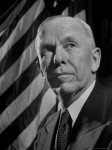 George Marshall (1880-1958) was an American military commander and Secretary of State between 1947 and 1949. Born in Pennsylvania to an affluent middle-class family, Marshall was educated at a Virginian military academy, where he graduated top of his class. The following year he obtained a commission in the United States Army. When the US entered World War I in 1917, Marshall was deployed to France, where he planned and commanded infantry operations. He excelled at strategic planning and finished the war with the rank of colonel. After the war Marshall remained in the army, working in training and as a base commandant. He continued his rise through ranks and with the outbreak of World War II was appointed US Army Chief of Staff.
George Marshall (1880-1958) was an American military commander and Secretary of State between 1947 and 1949. Born in Pennsylvania to an affluent middle-class family, Marshall was educated at a Virginian military academy, where he graduated top of his class. The following year he obtained a commission in the United States Army. When the US entered World War I in 1917, Marshall was deployed to France, where he planned and commanded infantry operations. He excelled at strategic planning and finished the war with the rank of colonel. After the war Marshall remained in the army, working in training and as a base commandant. He continued his rise through ranks and with the outbreak of World War II was appointed US Army Chief of Staff.
As Chief of Staff Marshall oversaw the expansion, retraining and modernisation of the army. No individual did more to organise and prepare the US Army for its involvement in World War II. Marshall was involved in planning and authorising major American campaigns and operations, including the D-Day landings in 1944. After retiring from the military in late 1945, Marshall was sent to China to bring about a resolution in the civil war between nationalist leader Jiang Jieshi and Mao Zedong’s communists, a mission he was unable to complete. In January 1947 Harry Truman appointed Marshall as Secretary of State and tasked him with overseeing the reconstruction of post-war Europe. Marshall’s development and support for the European Recovery Program (ERP) led to it becoming widely known as the Marshall Plan. The success of the ERP led to Marshall being awarded TIME’s Man of the Year (1947) and the Nobel Peace Prize (1953).
Marshall resigned as Secretary of State in January 1949 and headed the American Red Cross for a time. In 1950 the outbreak of the Korean War led Truman to appoint Marshall as his Secretary of Defence. He held this office for over a year, overseeing American military expansion and preparations for the war in Korea. In the early 1950s Marshall came under sustained attacks from Joseph McCarthy. In books and speeches, the Wisconsin senator accused Marshall of being a communist sympathiser involved in a “conspiracy on an immense scale”. McCarthy pointed to Marshall’s meetings with Mao Zedong and other communists in China, followed by their victory in 1949, as evidence of his treachery. A cautious and dignified figure, Marshall did not respond to these vitriolic attacks. After resigning as defence secretary (September 1951) Marshall retired from public life. He died in Washington DC in October 1959.
Content on this page is © Alpha History 2018-23. This content may not be republished or distributed without permission. For more information please refer to our Terms of Use.
This page was written by Jennifer Llewellyn and Steve Thompson. To reference this page, use the following citation:
J. Llewellyn & S. Thompson, “George Marshall”, Alpha History, accessed [today’s date], https://alphahistory.com/coldwar/george-marshall/.
